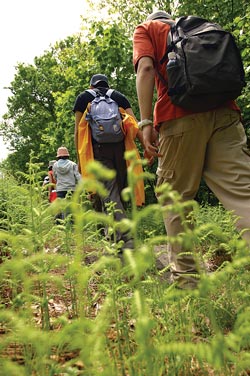
This is a tick of the genus lxodes, one of many types of ticks that can transmit Lyme disease to humans.
Photo: World Health Organization (WHO)

A word to the wise this summer: Keep a sharp eye out for ticks. Their bites can bring on serious health problems.
What Are Ticks?
If you spend any time outdoors, you've probably crossed paths with ticks. Ticks are small bloodsucking parasites. They aren't insects; they're actually related to spiders and have eight legs. Many ticks don't carry diseases, but some transmit diseases to animals and people.
Reducing Your Exposure
It's wise to check for ticks every day, especially in warmer months. Ticks can be very small, so carefully examine your skin for them. They may be as small as a poppy seed.
To reduce your chances of exposing yourself to ticks:
- Separate the "play areas" of your lawn and bushes, shrubs, high grasses, and other types of vegetation that ticks favor. Be sure to give your pets preventive flea and tick medicines, even if they stay indoors; you and your visitors can bring ticks along for the ride and into your home.
- When walking in a park or other outdoor natural setting, take a few precautions:
- Wear long pants and long sleeves, and choose light colors in order to spot ticks easily.
- Use insect sprays containing 20 percent DEET on skin and clothes (or permethrin on clothes only).
- When walking on natural trails, stay on the trail.
- Always check your skin carefully for ticks after any outing into a natural area.
Fast Facts
- Ticks are small bloodsucking parasites that live off mammals, including humans and common household pets.
- Ticks can carry serious diseases. The most common is Lyme disease, with between 20,000 and 30,000 cases reported each year.
- Ticks are very common, so it's a good idea to check for ticks every day when working or playing outside—especially during warmer months.
- Correctly removing a tick and disinfecting the tick bite area are very important.
To Find Out More
- MedlinePlus: www.medlineplus.gov; type "ticks" in the Search box.
- Centers for Disease Control and Prevention (CDC): www.cdc.gov/Features/StopTicks/ and www.cdc.gov/ticks/index.html
- NIAID: http://www.niaid.nih.gov/topics/tickborne/Pages/default.aspx
